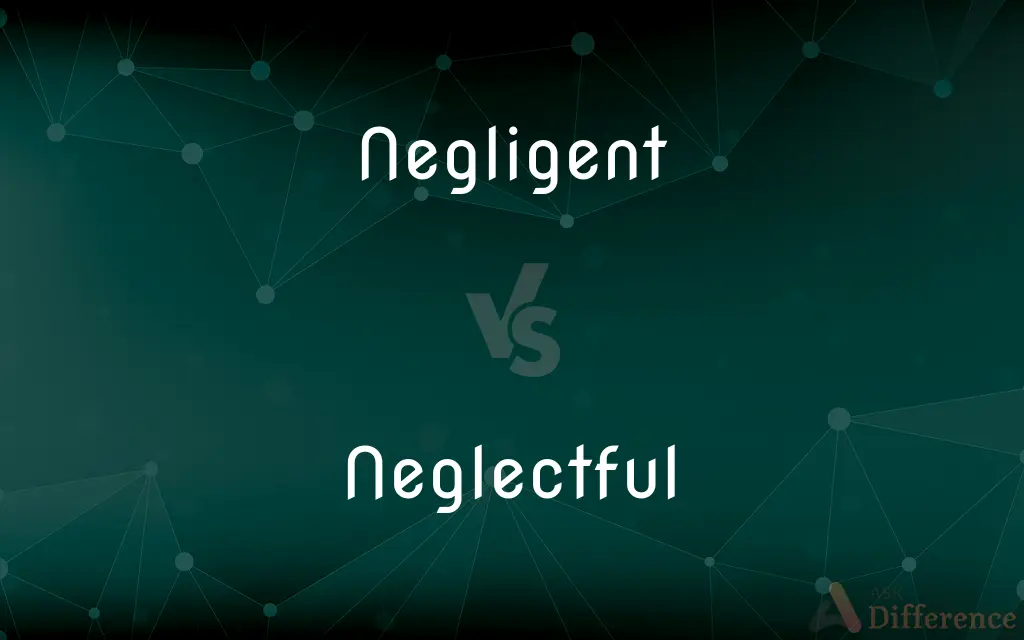Negligent vs. Neglectful — What's the Difference?
By Fiza Rafique & Maham Liaqat — Updated on March 28, 2024
Negligent refers to failing to take proper care in doing something, often leading to harm or risk, while neglectful specifically describes not giving proper care or attention, especially to a person or duty.

Difference Between Negligent and Neglectful
Table of Contents
ADVERTISEMENT
Key Differences
Negligent behavior often relates to a broader context of failing to act with the care expected, leading to potential harm or damage. This can apply to various scenarios, from professional duties to everyday tasks. On the other hand, being neglectful directly points to a failure in giving necessary care or attention, typically towards someone's needs or responsibilities.
Negligence can manifest in professional settings, such as in medical or legal practices, where the failure to provide expected care or service can result in significant consequences. Whereas neglectfulness is more commonly associated with personal relationships and duties, such as a caregiver failing to meet the needs of those they are responsible for.
Legal ramifications are more pronounced with negligence, especially when it results in harm or loss. It often involves a breach of duty that was expected to be upheld. Neglectfulness, while it can have legal consequences, particularly in cases of child or elder neglect, is often viewed through a moral or ethical lens, focusing on the disregard for the well-being of others.
Negligent acts might occur due to oversight, lack of knowledge, or failure to follow established protocols. This indicates a lapse in meeting the standards of care or responsibility. Neglectful behavior, however, implies a conscious choice to ignore the needs or welfare of others, suggesting a deeper level of disregard.
Both negligence and neglectfulness highlight a failure to meet expected standards of care, but negligence is often discussed in terms of legal accountability and professional misconduct, whereas neglectfulness is more associated with personal failings and the direct impact on others' well-being.
ADVERTISEMENT
Comparison Chart
Definition
Failure to take proper care in one’s actions, leading to potential harm or risk.
Not giving proper care or attention to someone or something, especially a duty or responsibility.
Context
Broad, including professional and personal scenarios.
Often associated with personal care or duties.
Legal Ramifications
Significant, especially in professional settings.
Can have legal consequences, particularly in cases of care duties.
Manifestation
Can occur due to oversight, lack of knowledge, or failure to follow protocols.
Implies a conscious choice to ignore needs or welfare.
Main Focus
Meeting expected standards of care and responsibility.
Providing necessary attention and care to responsibilities or individuals.
Compare with Definitions
Negligent
Showing a lack of attention or care that results in harm or risk.
The company was found negligent for not following safety protocols.
Neglectful
Failing to do what one should in their role or duty.
The teacher was neglectful in addressing the bullying incidents in class.
Negligent
Legally responsible for failing to meet the standard of care.
The doctor was sued for being negligent in diagnosing the patient.
Neglectful
Demonstrating a lack of consideration for the consequences of one's inaction.
The supervisor's neglectful attitude compromised workplace safety.
Negligent
The absence of appropriate action in a situation requiring it.
Negligent maintenance of the equipment led to the accident.
Neglectful
Showing indifference or disregard to the needs or well-being of others.
The caretaker was neglectful in attending to the elderly person's health.
Negligent
Characterized by neglect of duties or responsibilities.
The negligent oversight of the project resulted in its failure.
Neglectful
Not giving enough care or attention to people or things that are one's responsibility.
The neglectful parent failed to provide basic needs for their child.
Negligent
Failing to take proper care or to act with the required level of attention.
The driver was negligent in not observing the stop sign.
Neglectful
Lacking in attention to detail or ignoring necessary tasks.
The neglectful behavior led to a decline in the garden's beauty.
Negligent
Given to or characterized by neglect, especially habitual neglect
The negligent worker missed another deadline.
Neglectful
Characterized by neglect; heedless
Neglectful of their responsibilities.
Negligent
(Law) Acting with or done through negligence.
Neglectful
Tending to neglect; failing to take care of matters which require attention.
Negligent
Careless or inattentive.
Neglectful
Full of neglect; heedless; careless; negligent; inattentive; indifferent.
A cold and neglectful countenance.
Though the Romans had no great genius for trade, yet they were not entirely neglectful of it.
Negligent
(legal) Culpable due to negligence.
Neglectful
Leaving vulnerable;
Neglectful of her own financial security
Negligent
Apt to neglect; customarily neglectful; characterized by negligence; careless; heedless; culpably careless; showing lack of attention; as, disposed in negligent order.
He that thinks he can afford to be negligent is not far from being poor.
Neglectful
Not showing due care or attention;
Inattentive students
An inattentive babysitter
Neglectful parents
Negligent
Characterized by neglect and undue lack of concern;
Negligent parents
Negligent of detail
Negligent in his correspondence
Neglectful
Failing in what duty requires;
Derelict (or delinquent) in his duty
Neglectful of his duties
Remiss of you not to pay your bills
Negligent
Marked by insufficient care or attention;
A negligent housekeeper
Negligent about personal cleanliness
Common Curiosities
What does it mean to be neglectful?
To be neglectful is to not provide adequate care or attention to someone or something one is responsible for.
Can negligence be unintentional?
Yes, negligence can result from oversight, lack of knowledge, or failure to adhere to protocols, and may not always be intentional.
How are negligence and neglectfulness addressed in the workplace?
These issues are often addressed through disciplinary actions, training, and policies to prevent harm and ensure accountability.
What defines someone as negligent?
Being negligent means failing to take proper care in one's actions, often resulting in harm or risk.
Can neglectfulness be mitigated or resolved?
Yes, through increased awareness, education, and support, neglectful behaviors can often be mitigated or resolved.
How do negligence and neglectfulness differ in legal contexts?
Negligence has significant legal implications, especially in professional misconduct, while neglectfulness can lead to legal consequences in personal duty or care contexts.
Are there different types of negligence?
Yes, there are various forms, including gross negligence, which indicates severe lack of care, and professional negligence, which relates to failing to meet industry standards.
What impact does neglectful behavior have on relationships?
Neglectful behavior can severely damage relationships, leading to loss of trust and emotional harm.
How do societies typically react to negligent or neglectful actions?
Societies may react with disapproval, legal action, and demands for accountability, especially when such actions result in harm.
Is neglectfulness always a choice?
Neglectfulness often implies a conscious decision to ignore the needs or well-being of others, indicating a level of disregard.
What measures can organizations take to prevent negligence?
Organizations can implement strict protocols, training programs, and oversight mechanisms to minimize the risk of negligence.
Can a person be both negligent and neglectful?
While the terms have nuances, a person's actions can be described as both if they fail to provide due care in their responsibilities, leading to harm or neglect.
How does one prove negligence or neglectfulness in court?
Proving these requires demonstrating a failure to meet a standard of care or duty, leading to harm or damage.
What role does intention play in determining negligence or neglectfulness?
Intention can influence the perception and legal outcomes of both negligence and neglectfulness, with intentional acts generally seen as more egregious.
Why is understanding the difference between negligent and neglectful important?
Understanding the distinction helps in accurately identifying the nature of the failure in care or duty, which is crucial for addressing the issue legally and socially.
Share Your Discovery

Previous Comparison
Graphology vs. Graphetics
Next Comparison
Docked vs. MooredAuthor Spotlight
Written by
Fiza RafiqueFiza Rafique is a skilled content writer at AskDifference.com, where she meticulously refines and enhances written pieces. Drawing from her vast editorial expertise, Fiza ensures clarity, accuracy, and precision in every article. Passionate about language, she continually seeks to elevate the quality of content for readers worldwide.
Co-written by
Maham Liaqat















































